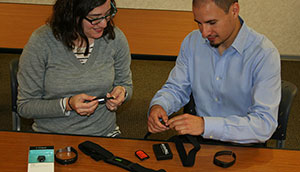- Our Research
- Research Areas
- Addictions
- Aging & Geriatrics
- Behavior Change
- Biostatistics
- Cancer
- Cardiovascular Health
- Child & Adolescent Health
- Chronic Illness Management
- Health Informatics
- Health Services & Economics
- Healthy Communities
- Medication Use & Patient Safety
- Mental Health
- Obesity
- Preventive Medicine
- Social Determinants of Health
- Vaccines & Infectious Diseases | COVID-19
- Our Scientists
- Collaborate with Us
- Our Publications
- Research Funding Sources
- Research Areas
- News and Events
- Get Involved
- About Us
- Live Healthy
All Articles on Obesity
- Older people can learn to spend less time sitting down
Coaching helped Kaiser Permanente patients sit half hour less per day in pilot study.
- Surgery for obesity is linked to longer survival
JAMA study focuses mostly on male VA patients with more diseases than in prior studies.
- Video: New research on bariatric surgery for obesity
GHRI's Dr. David Arterburn talks about bariatric surgery research in December 2014.
- Surgery for obesity is linked to longer survival
JAMA study focuses mostly on male VA patients with more diseases than prior studies.
- Heart(rate) on your sleeve: Activity trackers aid health research
Kaiser Permanente researchers are asking: Can fitness trackers change health as well as activity?
- How well does bariatric surgery work?
The number of bariatric surgeries done each year in the United States has ballooned. Now, in an August 27 state-of-the-art review in The BMJ and a September 3 editorial in JAMA, David Arterburn, MD, MPH, weighs the evidence on the benefits and risks of the various types of this surgery.
- Research shows online care from dietitians helps control weight
Where’s a dietitian when you need one the most? The e-Care for Heart Wellness study– which tested ways to help patients lower their blood pressure and risk for heart-disease and stroke–sought to solve this common need.
Kaiser Permanente Washington Health Research Institute for:
Kaiser Permanente Washington Health Research Institute
Phone: 206-287-2900Fax: 206-287-2871
Contact us
Sign up for our newsletter
Policy on Conflict of Interest
Nondiscrimination Notice and Language Access Services
Land Acknowledgment
Our Seattle offices sit on the occupied land of the Duwamish and by the shared waters of the Coast Salish people, who have been here thousands of years and remain. Learn about practicing land acknowledgment.







